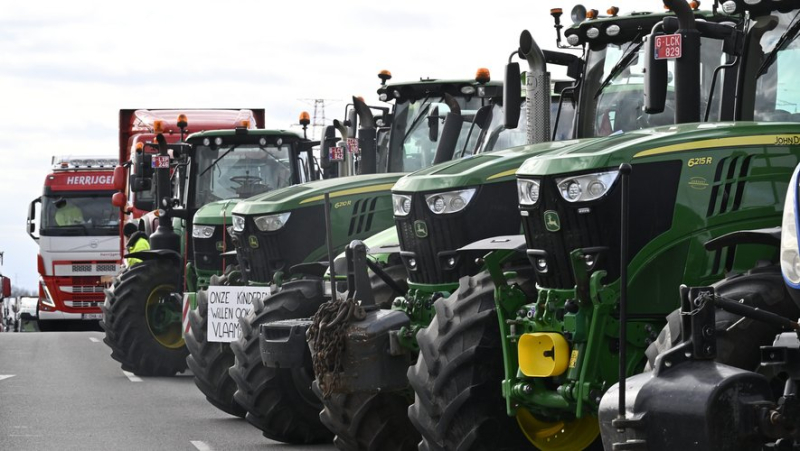Farmers' blockades: how the French movement is expanding in Europe

Ici en Belgique, la colère du monde agricole s'étend. MAXPPP – DIRK WAEM
The anger of farmers continues to grow in France and is spreading across Europe despite new announcements from the government of Gabriel Attal and the European Commission to try to contain the protest. Tension has risen further on the outskirts of Paris, where farmers intend to lay siege to the city. since Monday by blocking several highways leading to the capital, and near the Rungis wholesale market, to which some want to prevent access.
Eighteen people were arrested because "the red line of the attempted blockade of Rungis was crossed”, we learned from a source at the Paris police headquarters. The Minister of the Interior, Gérald Darmanin, announced on access to Rungis, the main supply platform for the Paris region with agricultural products.
He had previously declared on France 2 that there was "no question of evacuating" farmers who occupy major roads in France, while recalling the "clear lines" set by the authorities: do not block Paris, the Rungis market, or the airports.
The demonstrations, tractor processions and road blockades do not only concern Paris but also many French regions, with, according to Gérald Darmanin, some 10,000 demonstrators at around a hundred blockade points across France.
"The wait is huge"
The head of government, Gabriel Attal, and his ministers have been multiplying announcements in vain since Friday to try to calm the anger of farmers, who denounce both an excess of environmental standards and administrative constraints, the pressure on their prices exerted by food manufacturers and mass distribution, "unfair competition" of EU and non-European countries, notably Ukraine, and a lack of consideration.
During a hearing in the Senate, Arnaud Rousseau, president of the FNSEA, France's leading agricultural union, criticized Gabriel Attal for having attempted "a great communications operation" with its first announcements on Friday in a farm in Occitanie, "which ultimately resulted in a form of overannoyance and (…) led us to the situation in which we are" .
"What is happening at the moment is the accumulation of rules, of standards that at the beginning you accept, it grates a little, and then at one point when you have arrived “If it's overflowing, it's overflowing,” he said. “This is the moment we're in. (…) The wait is enormous and perhaps even beyond what we imagine."
The Minister of the Economy, Bruno Le Maire, in turn announced on Wednesday the establishment of 500 controls in large-scale distribution, double the usual number, to guarantee compliance with the provisions of the Egalim laws intended to provide better remuneration. Farmers. The Minister of Agriculture, Marc Fesneau, for his part, promised the release of 80 million euros to help the wine sector to "cover the hazards" recently encountered in France, the mildew crisis in the South-West in particular.
EU proposes measures on Ukrainian imports
Marc Fesneau is due to meet on Wednesday afternoon the commissioners for the Internal Market, Thierry Breton, and for Agriculture, Janusz Wojciechowski, in Brussels, where this crisis will arise on Thursday on the agenda of a European summit initially devoted in particular to aid to Ukraine, whose imports of agricultural products are fueling the anger of peasants across the country. #39;European Union.
Faced with this protest, the European Commission proposed several measures on Wednesday, including the establishment of an "emergency brake" on imports of certain Ukrainian products. The European executive wants to extend for one year, until June 2025, the suspension of customs duties and quotas on Ukrainian agricultural exports to the EU, on behalf solidarity with Kiev in the face of the Russian invasion, but it is considering safeguard measures, including the possibility for member states to temporarily limit imports of poultry, eggs and sugar from ;#39;Ukraine.
The Commission also proposed exemptions in 2024 from the obligation to set aside part of the land fallow to continue to receive European aid, on condition of planting certain crops such as lentils or peas.
While, beyond France, farmers have already expressed their anger in recent weeks in Germany or Romania, their Spanish or even Italian counterparts have decided to join the movement, the latter promising to demonstrate on Thursday in front of the European Parliament in Brussels.
In Belgium, more than 100 tractors blocked access to the large commercial port of Zeebrugge on Wednesday, according to one of the organizers of the demonstration. Gatherings are also reported around the port of Antwerp, the second largest in Europe behind that of Rotterdam




